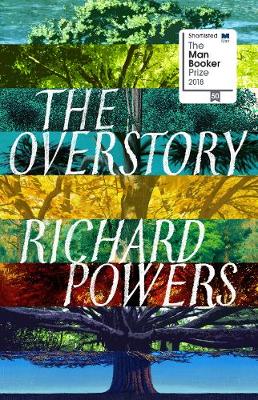Reviewed by clementine on
So, here are my problems:
1) Some of the descriptions of female characters were like... yeah, a man wrote this. There is a scene in this book in which a 35-year-old man gets turned on by watching his girlfriend pee. There is such an abundance of amazing female novelists out there that I am growing impatient with this sort of thing. I'm sorry. This is a dealbreaker. Learn how to write a young female character without sexualizing her bizarrely. (Ugh, it was really the character Olivia who was the worst - a manic pixie dream girl who (show spoiler)[dies tragically while still young and beautiful to further the emotional development of the men] .) Anyway, it's 2019, we are not doing this anymore.
2) It is very polemical, and through monologues given by the various environmental activist characters, Powers' own ideas about environmentalism come through strongly. I'm not opposed to the politicization of books (quite the opposite, actually), and I don't disagree with the message - I just think that from a technical standpoint, the finesse was not always there. When a character gives a literal speech containing your opinion, that is an idea that has not been worked seamlessly into the fictional text. While Patricia was initially one of the most interesting characters to me, she ended up mostly being a vehicle for Powers' own thoughts on environmentalism, which was disappointing.
3) There were definitely some passages that dragged. I liked the first part of the book, which read like a series of vignettes, the best. The rest of the book had a lot of strong parts, but it took a while for everything to come together and not all of the meandering felt purposeful, necessary, or enjoyable.
4) There are storylines that never properly converge. Obviously, it is Adam, Olivia, Douglas, Mimi, and Nick who are the central characters pushing the narrative forward; Patricia is peripheral; Neelay, Dorothy, and Ray never join the rest of our environmental activists (except through reading Patricia's book oh and also the very clearly-broadcast revelation that (show spoiler)[Dorothy and Ray are Olivia's parents] ). Dorothy and Ray's story felt very separate from the rest of the book, which is a damn shame because it was actually the most emotionally-compelling storyline.
5) Powers doesn't leave much in the way of subtext. He bludgeons us with the same unsubtle messages over and over again.
There was a lot to like here, and I could be generous and round my rating up, but I'm going with my gut here. That said, I often think about imperfect books for a lot longer than I do ones that I initially give higher ratings, which speaks highly of that book's good qualities.
Reading updates
- Started reading
- 15 January, 2019: Finished reading
- 15 January, 2019: Reviewed
